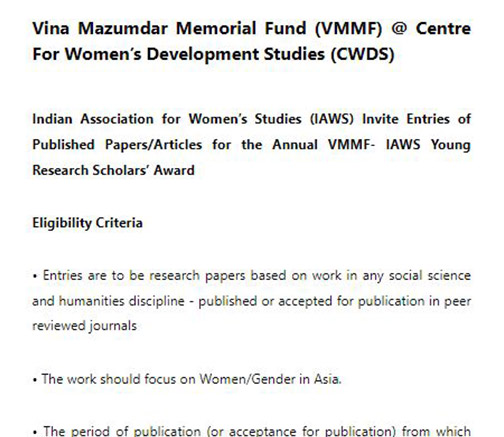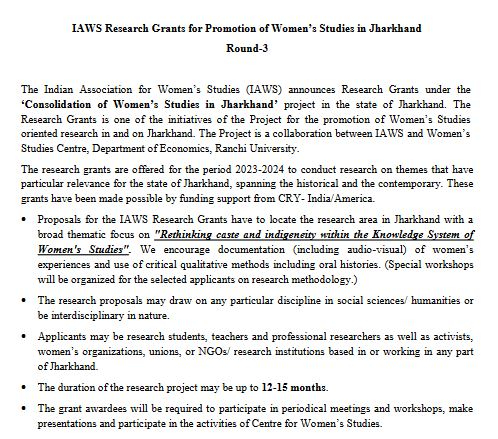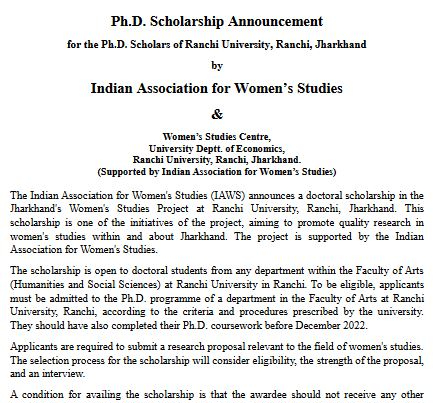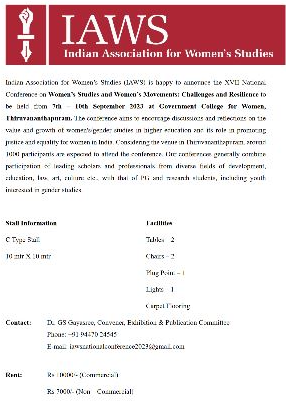Announcements
Northern Regional Conference 2023, 5th and 6th of May
GENDERING RIGHTS, DEBATING JUSTICE: ISSUES AND CONCERNS
Call for Papers
The IAWS Northern Regional Committee is organizing its conference on the central theme, Gendering Rights, Debating Justice: Issues and Concerns, in Miranda House College, University of Delhi on the 5th and 6th of May 2023. The conference will be hosted over these two days and will comprise panel discussions and presentations of research papers.
Abstracts of not more than 500 words to be emailed to: [email protected]
The last date for submitting abstracts is extended to 17 March 2023.
Selected abstracts will be communicated by 18 March 2023. Final papers to be submitted by 25 April 2023.
Papers in Hindi and English are welcome.
Concept Note
In the diversity of life, we see women constitute the majority of those trapped in oppression and exploitation. The average woman in India has fewer resources, less power, and restricted access to secure paid employment. The glaring disparities and deprivation in women’s lives are further evident in the extremely limited influence that they exercise within family structures, other intimate relations, the workplace, the political space, and within larger society in India.
Marked gender discrimination persists in workplaces and a large number of women remain locked into lower rungs of the job market. Further, workforce participation of women continues to fall as the state fails to curb high unemployment rates and steadily withdraws public investment from the social sector; triggering in turn higher quantums of unpaid work by women within the household and their dependency on male earners of the household. Within this broader context, patriarchal practices and prejudices tenaciously operate. These practices and prejudices continuously adapt to changing socio-economic realities, and thus, punctuate the majority of women’s lives with newer forms of patriarchal oppression.
In present contexts, the vulnerability of the majority of women has manifested itself in the increasing drop-out rates in educational institutions, poor health conditions, growing figures of gender crimes, reinforcement of retrogressive laws and customs, and persistent communal polarisation of basic rights such as the right to choice, the right to privacy, citizenship claims, etc. With regard to communal polarisation, the harassment of inter-faith couples, the ongoing hijab controversy, the proliferation of anti-conversion laws across the country, the demonizing of migrants from a particular religious community, and denial of justice to victims of communal riots, among other developments, are apt examples of the steady erasure of rights and constitutional safeguards. Similarly, the impunity with which caste-based gender violence has unfolded in recent times, the repeated instances of compromised police investigations, and lengthy court proceedings, together pose a serious challenge to the realisation of social justice in general, and gender justice in particular.
Evidently, the experiences of inequality enveloping the lives of majority of women are shaped in complex ways by class position, caste hierarchy, ethnicity, regional disparities, age, sexual binaries, state policy, religious and other fundamentalisms. Notably, these realities comprising entrenched economic inequalities, skewed developmental policies, precarious livelihoods, oppressive patriarchal regimes, pervasive violence, gender stereotyping, moral policing, etc., are resisted through rigorous efforts to create a more egalitarian society that can empower women and other vulnerable and exploited social groups. Of course, these endeavours are regularly thwarted by the rising tide of conservative authoritarianism which has been successfully using state apparatuses to restrict the physical, sexual and social freedoms of women. Authoritarian political power and its mass propaganda often combines a constructed homogeneous “national” community with an intense dislike for social movements, campaigns, organisations, activists and intellectuals who seek to enlarge as well as defend rights and justice. It is precisely such a context that fuels a dangerous intolerance; ranging from the culture of banning the work of progressive writers/poets, to the incarceration of activists under draconic laws, to the vicious trolling of young people for innocuous social media posts, to the slapping of FIRs against journalists, bloggers and comedians who seek to expose injustices.
In this context of the undermining of crucial rights, watering down of constitutional values, and intense contestation over pervasive inequality, the parameters of gender disparity continue to evolve in complex way. In turn, the scope of gender rights and gender justice are continually changing. Envisaging and defending gender rights and gender justice has, thus, increasingly proven difficult without transforming the wider structures and processes in which the majority of women find themselves. Expectedly, deeper analysis and critiques of the existing socio-economic system stand to reveal complex interconnections between economic growth, development policies, laws, governance and women’s status in the country.
The sub-themes include: (the list is illustrative and not exhaustive)
- Gender and work
- Violence and crimes against women
- Gendering law
- Caste, religion, community and debating tradition
- Sexual Diversities
- Gender and citizenship
- Gendering environmental justice
- Gender and health rights
- Pandemic and post-pandemic parameters of precarity
- Gender and political rights
Coordinators:
Dr. Shadab Bano
Coordinator, Northern Regional Committee
Indian Association for Women’s Studies (IAWS)
Dr. Maya John
Northern Regional Conference Coordinator (2023)
Northern Regional Committee (IAWS)
Dr. Abha Dev Habib
Local Coordinator
Convenor, Women’s Development Cell Miranda House
College, University of Delhi
For more information, contact: [email protected]





